| See the Interventions book series announcement, a new series from the Centre of Theology and Philosophy and Eerdmans Publishing, edited by Dr Conor Cunningham and Dr. Peter Candler. | |
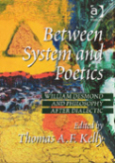 | Thomas A. F. Kelly (editor), Between System and Poetics: William Desmond and Philosophy After Dialectic This is the first book-length examination of the work of an important contemporary thinker in the continental tradition, William Desmond. His thought is a new, post-modern way of articulating what he calls the 'between'. Rooted in Plato and Augustine, and advancing through a confrontation with Hegel and Nietzsche, Desmond rejects facile scepticism and wins through to a strikingly original and powerfully searching articulation of the human. The present volume contains essays on Desmond's work both by emerging scholars and by well-established thinkers. It also contains a specially written essay on the practices of philosophy by Desmond himself. |
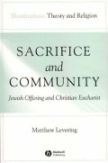 | Matthew Levering, Sacrifice and Community: Jewish Offering and Christian Eucharist (Illuminations: Theory and Religion) About this book: This book explores the character of the Eucharist as communion in and through sacrifice. It will stimulate discussion because of its controversial critique of the dominant paradigm for Eucharistic theology, its reclamation of St Thomas Aquinas's theology of the Eucharist, and its response to Pope John Paul II's Ecclesia de Eucharistia. |
 | Rudi Te Velde, Aquinas on God: The 'Divine Science' of the Summa Theologiae (Ashgate Studies in the History of Philosophical Theology) It would be difficult to find a more astute retrieval of Thomas Aquinas on God than this seamless account, which presents erudition lightly yet competently, culminating in the startling assertion that Aquinas cannot be dubbed a 'theist'. Finding out how and why this is the case embodies the joy of discovery attendant upon the text. --David Burrell, C.S.C., Hesburgh Professor in Philosophy and Theology, University of Notre Dame, Indiana, USA. |
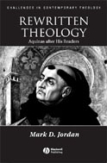 | Mark D. Jordan, Rewritten Theology: Aquinas After His Readers (Challenges in Contemporary Theology) |
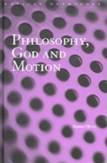 | Simon Oliver, Philosophy, God, and Motion (Radical Orthodoxy) 'This is an original and thought-provoking history of ideas about motion. Dr. Oliver boldly discards traditional modern disciplinary divisions and shows how, for many classical and medieval thinkers, motion was a central category in such apparently diverse fields as physics, astronomy, human cognition, and theology. His intriguing conclusion points to the contemporary relevance of these earlier conceptions of motion. This book makes a major new contribution to our understanding of the relationship between theology and science, and is to be warmly welcomed.' -- Peter Harrison, Professor of History and Philosophy, Bond University, Australia, author of The Bible, Protestantism and the Rise of Natural Science 'Motion, for most of us, is local motion - two billiard balls crashing together. For Dante it was love that moved the planets and the stars. In this elegant and informative study Simon Oliver charts the metaphysics- and the theology- of motion from Plato and Aristotle through Aquinas and the medievals to Newton and the modern period. Modern physics , he suggests, may as yet point us to a world far more governed by relation than that of Newton's solitary objects and indifferent forces. This book must rank as one of the most important contributions to the science and religion debate of recent years and will equally be important to theologians, medievalists and philosophers of religion.' -- Janet Soskice, Reader in Modern and Philosophical Theology, University of Cambridge, UK |
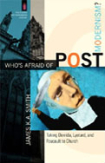 | James K. A. Smith, Who's Afraid of Postmodernism?: Taking Derrida, Lyotard, And Foucault to Church (Church and Postmodern Culture) "This delightful book is a twofer. Smith first shows, through a careful reading of the texts, that central themes of three major postmodern philosophers are a threat not to biblical Christianity but only to an all too modern, all too complacent church. He then argues strongly for a church that learns from postmodernism how to revitalize its premodern heritage. The movie analyses that open each chapter render the argument at once more concrete and more powerful."--Merold Westphal, distinguished professor of philosophy, Fordham University "I find Who's Afraid of Postmodernism? to be stunningly clear. Smith's writing is not an argument whose logic you must follow but a narrative that opens windows. I continually found myself saying 'Well, of course, why didn't I see that before? It's so obvious.' Smith helps us understand why postmodernism sets the stage for the restoration of the ancient faith."--Robert Webber, Myers Professor of Ministry, Northern Seminary; author of Ancient-Future Faith |
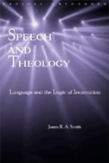 | James K. A. Smith, Speech and Theology: Language and the Logic of Incarnation (Radical Orthodoxy) About the Book: This important contribution to the ground-breaking Radical Orthodoxy series revisits the works of Husserl, Heidegger, Augustine and Derrida to reconsider the challenge of speaking of God through predication, silence, confession and praise. James K. A. Smith argues for God's own refusal to avoid speaking as well as for our urgent need of words to make Him visible to us. This leads to a radical new "incarnational phenomenology" in which God's love endows imperfect signs with the means to indicate true states of infinitude, and in which we may ultimately discover a new theology of the arts. |
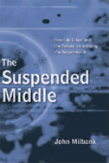 | John Milbank, The Suspended Middle: Henri De Lubac And The Debate Concerning The Supernatural "An encounter of two true authors is not very frequent in theology today, but it is just such a privileged moment that the reading of this little book offers. While it introduces the reader to the work of Henri de Lubac, The Suspended Middle also introduces some key themes of John Milbank's thought. "Henri de Lubac is a difficult theologian: as a major historian of Latin theology, he is a master in the art of concealing his own theology behind the erudite discussion of past and present works. It is not the smallest merit of John Milbank's book, therefore, to prove that de Lubac is more a theologian than a historian of theology. . . . Milbank*s provocative book manages to make [de Lubac's theology] relevant for modernity as well as for postmodernity. This is probably the most exciting book ever written on de Lubac." Jean-Yves Lacoste |
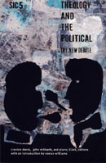 | Creston Davis (Editor), John Milbank, Slavoj Žižek, Rowan Williams (Introduction), et. al, Theology and the Political: The New Debate SIC V ([sic] Series) (Paperback) "Underlying all the very varied essays in this volume is a set of issues about how we understand human action. And what the essays have in common, I believe, is a conviction that the fundamental requirement of a politics worth the name is that we have an account of human action that decisively marks its distance from assumptions about action as the successful assertion of will. If there is no hinterland to human acting except the contest of private and momentary desire, meaningful action is successful action, an event in which a particular will has imprinted its agenda on the 'external' world. Or, in plainer terms, meaning is power . . . and any discourse of justice is illusory." -- Rowan Williams, Archbishop of Canterbury, from the introduction |
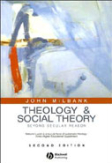 | John Milbank, Theology and Social Theory, 2nd Edition Praise for the Second Edition "Theology and Social Theory has proven to be a bombshell... We are, therefore, extremely fortunate to have this second edition with Milbank's dazzling new 'Preface'. Re-reading this book is always a pleasure, because it is filled with surprises that force thought." Stanley Hauerwas, Duke University "When the first edition was published the reaction was one of shock. Now, fifteen years on, the shock has worn off; more and more people are questioning the universal competency of secular reason. But this make all the more important the publication of this second edition. Milbank develops an alternative which has been steadily developing and enriching in the intervening years." Charles Taylor, McGill University Praise for the First Edition "Milbank’s work is a tour de force of systematic theology." Times Higher Education "John Milbank’s sprawling, ambitious and intellectually demanding book is in a class of its own." Studies in Christian Ethics |
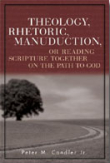 | Peter M., Jr. Candler, Theology, Rhetoric, Manuduction, or Reading Scripture Together on the Path to God (Radical Traditions) 'Peter Candler is an attentive, passionate, and ingenious reader of masterworks in Christian theology. Correcting the standard histories, posing constructive questions to prevailing prejudices, he restores the memory of theologians who became eloquent just because they wanted to teach — and to contemplate.' Mark D. Jordan |
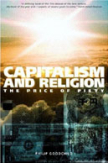 | Philip Goodchild, Capitalism and Religion ‘A defining book of this first decade of the new century…My book of the year and, I suspect, of several years to come’, Keith Ansell Pearson |
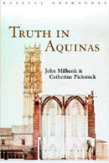 | John Milbank and Catherine Pickstock, Truth in Aquinas ‘No work so effectively delivers Thomas from the Thomists’, David Burrell |
 | John Milbank, Being Reconciled ‘John Milbank is unquestionably among the most sophisticated voices in the whole world of modern theology’, Rowan Williams ‘Here, finally, is the antidote to the flourishing post-modern “post-secular” industry—a touch of the real thing, like a glass of freshly squeezed orange juice after a chemical “orange drink”. Religion is for Milbank a real substantial engagement, and social critique a true commitment to social change, not the academic game of “resistance”.’ Slavoj Žižek |
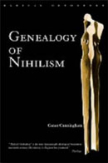 | Conor Cunningham, Genealogy of Nihlism 'This is an audacious work and it is difficult to do justice to the complexity of the argument or the subtlety of the terms invoked. However, this work also sparkles with simplicity ... Overall this is a dazzling performance.' Reviews in Religion and Theology ‘If the book is not a consistent virtuoso performance (and it may be close to that), in my judgement it is at least an intermittent virtuoso performance…[Cunningham] shows us how hard thinking can also be ecstatic thinking’, Journal for Cultural and Religious Theory. ‘Genealogy of Nihilism should be requisite reading for an understanding of the metaphysics of “radical orthodoxy”, as well as for any theological response to modern or postmodern philosophy’, Modern Theology ‘Compelling in its remarkable synoptic breadth and conceptual audacity….. ambitious, adventurous and ingenious’ Radical Philosophy |
 | John Milbank, The Word Made Strange ‘A truly brilliant and insightful work’, Charles Taylor ‘All those who were awed by Theology and Social Theory will be even more awed by this book’, Stanley Hauerwas |
 | John Milbank, Catherine Pickstock and Graham Ward, Radical Orthodoxy |
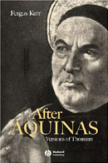 | Fergus Kerr, After Aquinas About this book: After Aquinas makes available in one volume all the material necessary for a rounded appreciation of Aquinas's work and his enduring influence. As well as revisiting Aquinas's own work, Kerr brings together a range of vies that have previously appeared in disparate places, thereby exploring alternatives to the standard understanding of Aquinas's writings. This book therefore represents a major revisionist treatment of Thomism and its significance, combining useful exposition with original, creative thinking. |
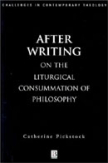 | Catherine Pickstock, After Writing "Among other things, the scholarly and philosophically sophisticated analysis in this book suggests why the reform of the liturgy instigated by Vatican II was always likely to fail - highly recommended!" -- Fergus Kerr, OP, Blackfriars, Edinburgh "This is an extraordinary achievement. It is scholarship informed by a theological imagination of the highest order." -- Graham Ward "After Writing establishes Catherine Pickstock as one of the most promising young theologians in the English-speaking world. The book is insightful, provocative, and of consistently high scholarly quality. Pickstock's critique of Derrida is particularly impressive." -- L. Gregory Jones, Duke University "Outside liturgy, outside the logic of the Mass, there can be no meaning. In developing this astonishing thesis, Pickstock comprehensively outflanks both modernity and postmodernity, and enunciates a wholly new, wholly orthodox theology. Her labyrinthine treatise, with is many hermetic inner corridors, ceaselessly refracting much of the best and often unknown recent work in philosophy, theology, history, and classics, establishes a new and formidable state of the art for theological writing. All theologians, philosophers, and Church leanders must read this supremely important book." -- John Milbank |
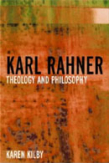 | Karen Kilby, Karl Rahner: Theology and Philosophy ‘[A] major contribution ……to Rahner scholarship, both in exposition and constructive critical reading, and the ease with which Kilby deals with massively complex materials, sustaining an elegant and subtle argument throughout. Anyone interested in modern theology will find it gripping and well worth the read’. Gavin D’Costa |
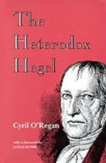 | Cyril O'Regan, Heterodox Hegel "It is a work of great originality and enormous comprehension that imposes itself upon Hegel scholarship by its sheer intellectual power, its creative expression, and its staggering erudition." -- Louis Dupré, Yale University "This work is original and brilliant as the first full-length study of the mystical background to Hegel. Cyril O'Regan's work is a ground-breaking study that will enable readers of Hegel to understand him within the context of the mystical tradition that he claimed as his own. For he made no secret of his filiation with the esoteric strangs of Christian mysticism and this was clearly the way he was understood by F.C. Bauer, as well as Feuerbach, Engels, Marx and many of his immediate successors. It has always struck me as a major lacuna in Hegel scholarship that such a study had not appeared. Now it has been flled in considerable measure." -- David Walsh, The Catholic University of America "I find this book utterly fascinating to read. In many respects it read like a detective novel. Hegel continues to grow in importance, and the metaphysical/theological aspect of his thought, which he places at the center, remains, indeed, central. There are a number of good books in the area in English, but nothing quite as ambitious and comprehensive as this study. It is a milestone in the study of Hegel's religious thought which no future work in the area will be able to ignore." -- Merold Westphal, Fordham University "This is an outstanding study of Hegel's philosophy of religion, exceptionally illuminating with respect to Hegel's account of the Trinity and the sources of Hegel's views. The author has an exceptional mastery of the entire tradition of speculative theology, a synoptic mastery of Hgel's texts and the major commentaries in English, German and French." -- William Desmond, Loyola College |
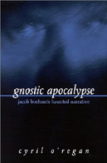 | Cyril O'Regan, Gnostic Apocalypse About this book: Jacob Boehme, the seventeenth-century German speculative mystic, influenced the philosophers Hegel and Schelling and both English and German Romantics alike with his visionary thought. Gnostic Apocalypse focuses on the way Boehme's thought repeats and surpasses post-reformation Lutheran thinking, deploys and subverts the commitments of medieval mysticism, realizes the speculative thrust of Renaissance alchemy, is open to esoteric discourses such as the Kabbalah, and articulates a dynamic metaphysics. This book critically assesses the striking claim made in the nineteenth century that Boehme's visionary discourse represents within the confines of specifically Protestant thought nothing less than the return of ancient Gnosis. Although the grounds adduced on behalf of the Gnostic return claim in the nineteenth century are dismissed as questionable, O'Regan shows that the fundamental institution is correct. Boehme's visionary discourse does represent a return of Gnosticism in the modern period, and in this lies its fundamental claim to our contemporary philosophical, theological, and literary attention. |
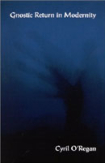 | Cyril O'Regan, Gnostic Return to Modernity 'An extraordinarily important work that should have an enormous impact', Thomas Altizer |
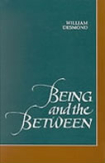 | William Desmond, Being and the Between |
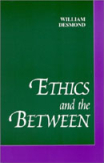 | William Desmond, Ethics and the Between |
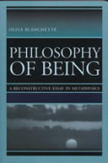 | Oliva Blanchette, Philosophy of Being |
یادداشت یعنی یادداشت، یعنی موقت، ناقص، نا رسا، در معرض تغییر و تکمیل و اصلاح و تنظیم مجدد.
۱۳۸۹ فروردین ۲۲, یکشنبه
Centre of Theology and Philosophy: Publications
Publications
اشتراک در:
نظرات پیام (Atom)

هیچ نظری موجود نیست:
ارسال یک نظر